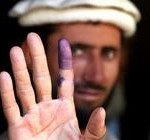Afghanistan’s parliamentary elections, set for September 18, will be seen as a test of that country’s stability nine years after the U.S.-led invasion, and three months before U.S. President Barack Obama reviews progress in the war effort. But if balloting is meant to serve as a litmus test for a military campaign that continues to sputter along, Afghanistan analyst Candace Rondeaux says the West should prepare for disappointment. For one, a surge in pre-election violence, coupled with a growing list of corrupt candidates, will discourage many Afghans from voting, Rondeaux says. Changes to the Afghan-run commission that investigates electoral fraud will also make a free and fair tally unlikely, she says. And while parliament has in recent months exhibited a willingness to challenge President Hamid Karzai on numerous issues, the corrupt lineup of candidates running this time makes it unlikely such independence will continue, she says.
In mid-September, thousands of Afghan candidates will compete for the 249-member lower house of parliament. How are the elections shaping up in terms of security, transparency, and potential turnout?
As we get closer to election day, we’re going to see very much a repeat of last year, where candidates, campaign managers, [and] members are at risk. We’ve had three candidates [killed] so far and that’s just the start. It’s safe to say that the competition is very high with so many candidates [over 2,550] in the field for such a small number of seats [249 seats are being competed for in the Afghan parliament]. It’s a very complex chess game. On the one hand, security is not very good because there’s an insurgency. But also, this sort of internecine competition between what are essentially members of a sort of political mafia have encouraged [candidates] to be a little bit more bold in their bullying and their intimidations against rivals. So this is really a very volatile situation. At the end of the day, it’s difficult to say what the impact will be. It’s very clear that we will not have a sitting parliament for many, many months to come even after the elections, in part because there’d be a lot of challenges. And it’s not entirely clear whether the ECC, the Electoral Complaints Commission, is fully equipped or prepared to deal with some hundreds of challenges in such a complex political field.
This article was originally published by Council on Foreign Relations. You can read the rest of the article here.
You can read exclusive content from Gateway House: Indian Council on Global Relations, here.
Copyright © 2010 by the Council on Foreign Relations, Inc.


